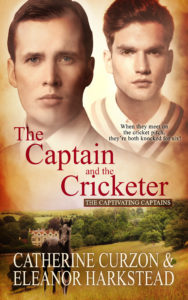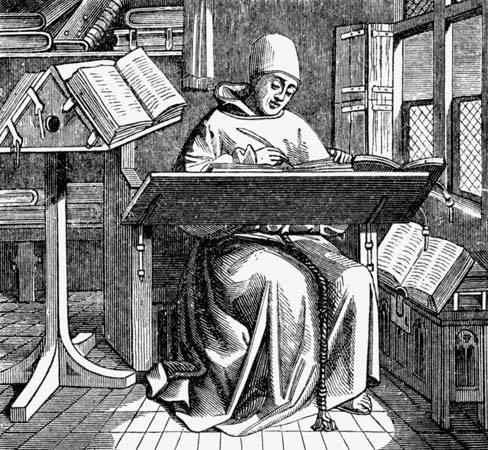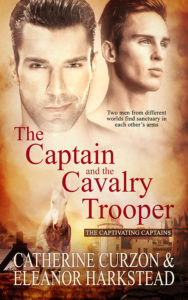Eleanor Harkstead's Blog, page 16
June 23, 2018
Mirrigold reviews The Captain and the Cricketer
This whole book just brought a massive smile to my face.
The first review for our rom com The Captain and the Cricketer comes from the lovely Mirrigold. Thank you!
Read the rest of the review at Mirrigold’s blog.
Mirrigold reviews The Captain and the Cavalry Trooper
I do love a good historical romance and I very much enjoyed this one set during the horrors of the First World War.
Thank you, Mirrigold! Read the review at Mirrigold’s blog.
June 6, 2018
Liz Crowe reviews The Captain and the Cavalry Trooper
Reading this book was like sitting down with a dish of rich, chocolate ice cream–at the same time decadently rich, but imminently satisfying.
5++ stars!
Read her review on Goodreads.
June 5, 2018
The Captain and the Cricketer: an excerpt

The second novel in The Captivating Captains series is published by Pride on 17th July 2017. You can pre-order your copy now, from Amazon, Kobo, Nook, and directly from the publisher.
When an uptight countryside vet and a sexy TV star meet on the cricket pitch, they’re both knocked for six!
Henry Fitzwalter is a solid sort of chap. A respectable rural vet and no stranger to tweed, he is the lonely inhabitant of crumbling Longley Parva Manor.
Captain George Standish-Brookes is everyone’s favorite shirtless TV historian. Heroic, handsome and well-traveled, he is coming home to the village where he grew up.
Henry and George’s teenage friendship was shattered by the theft of a cup, the prize in a hard-fought, very British game of cricket. When they resolve their differences thanks to an abandoned foal, it’s only a matter of time before idyllic Longley Parva witnesses one of its wildest romances, between a most unlikely couple of fellows.
Yet with a golf-loving American billionaire and a money-hungry banker threatening this terribly traditional little corner of Sussex, there’s more than love at stake. A comedy of cricket, coupling and criminality, with a splash of scandal!
Chapter 1
What on earth are they feeding these babies?
Another ruddy-cheeked mother passed her enormous child to Henry. He balanced it on his hip, smiling politely as he jiggled it up and down.
“What a lovely boy!”
Puppies, kittens, foals, lambs, calves and piglets were more Henry Fitzwalter’s style, the daily business of a countryside vet. He was at ease around them. But not human babies—they were strange and alien beasts indeed. The infant reached out its pudgy hand and tugged Henry on the nose, yanked Henry’s neatly trimmed sideburn then grabbed a length of his hair and pulled.
Henry winced. “Certainly a strong ’un!”
“Daniel, you bad boy!” His mother at least had the grace to be contrite regarding her infant’s outrageous thuggery, and wrestled the unfeasibly large child from Longley Parva’s vet.
Nestled in the South Downs, Longley Parva had been the home of Henry’s family for generations. And today, on this sunny Sunday afternoon, Longley Parva was closed for a street party to raise funds for the roof of the village hall.
Daniel was swapped for another child, who came accompanied by the odor of milk. Henry bounced the baby and it cooed at him. It appeared to be a little girl, judging by how frilly its outfit was, and although it was almost entirely bald, it was wearing a sequined Alice band.
A car tooted, an engine revved. A nearby shout of, “The road’s closed for the party—what’s the bloody matter with people?”
Women’s Institute stalwart Mrs. Fortescue tutted. “Mind your language in front of the babies!”
Henry, ignoring the baby’s grip on his knitted tie, stared from his vantage point at the top of the village’s High Street toward the other end, where barriers and stalls were being shifted as a car approached.
A classic car in British racing green nosed its way toward him. He knew it, because it had been tootling around the village for Henry’s whole life and for decades before that too. Everyone in England knew it, because this was the soft-top Jaguar of Captain George Standish-Brookes. This was the soft-top Jaguar that had transported its driver and his popular histories straight into the nation’s hearts.
Henry clenched his jaw. That bloody man.
Cries of “It’s Captain George!” filled the street, the Longley Parvans nudging one another and grinning, some even waving as the car wound its way along the crowded road. The final of the Bonny Baby Competition was forgotten.
George drove into the center of the village like the returning hero he was, classic Wayfarers hiding his eyes, the car horn blaring merrily and a crowd following as though the Red Sea had just parted.
George—Henry’s childhood friend through thick and thin, until the day the Longley Parva Cup disappeared. George—the television historian with the knowing wink and dazzling smile. George, who sailed through life without a care in the world, waving now at the locals as he drove toward the podium with one hand on the steering wheel.
The handsome bastard.
Of course the road closure didn’t apply to George, even though the vicar on his bicycle had been turned away and told to come back on foot. Rules never applied to Captain George Standish-Brookes. Not at school, not in his Bohemian home, and now, not at the village fête.
George made his own rules.
Unable to raise a hand in polite though grudging welcome without dropping the baby, Henry gave George a terse nod.
“Fitz!” George turned off the ignition and the car, somehow, came to rest at just the right angle for a classic car shoot. He pushed open the door and hopped out onto the green, a vision of easy, casual confidence in cricket sweater and chinos, his dark hair tousled just so, the sun glinting from the face of his watch.
Who still wears a watch these days, anyway?
Captain George did, because then he could wear a regimental watch strap too.
“What a welcome.” George laughed, pushing the Wayfarers up into his hair. He looked around at the bunting and sausage rolls, the orange squash and bonny babies. “Have I crashed a party?”
Henry clenched his jaw. “I suppose those sunglasses prevented you from being able to read the sign at the top of the road, Captain George? ‘Street party—strictly no entrance’. You nearly mowed down half the village, you fool!”
He had forgotten that he was standing in front of a microphone. After a blast of feedback, his sarcastic reprimand echoed down the bustling street.
“Shut up, vet’n’ry!” someone shouted from the crowd.
“Yeah, you shut up! It’s Captain George!” someone else chimed in. Within moments, the street was full of jeers aimed at Henry. Even the baby joined in, yanking Henry’s tie so hard he nearly headbutted the microphone. George stepped up, his hands held in front of him in a call for calm. Naturally, he knew how to use a microphone, there was no wail of aggressive feedback to deafen him.
“Hello, Longley Parvans!” A chorus of greeting went up. “Sorry for nearly mowing you down—blame my enthusiasm to see this marvelous village once more. Some things, I notice”—he cast a long, comical look at Henry—“never change!”
Henry glared at the car and glared at George. “No, they don’t, do they?”
The baby started to grizzle, its face turning tomato red. Henry bounced it more energetically on his hip, just as a hiccupping noise started up in its throat. He looked over his shoulder, wondering where its mother had got to. A reporter from the local paper had slipped in between the locals and had clambered onto the podium. “Give us a smile, Captain George! Can we get a few words for The Bugle?”
“I’ve just been around the world for my Secret History of Magellan, which you can watch this Christmas on the Beeb!” He winked, a twinkle in his eye that made at least one of the girls from the riding school fan her face. “And I still haven’t found anywhere as beautiful as good old Longley Parva!”
Applause rippled through the crowd, along with enthusiastic nods. And—for heaven’s sake, was it really necessary?—a cheer began.
“Hip-hip-hooray! Hip-hip-hooray! Hip-hip-hooray for Captain George!”
Mrs. Fortescue’s shoes banged loudly across the podium as she approached their returning hero. “Captain, could I possibly ask you to assist with the Bonny Baby Competition?”
“The divine Mrs. F.!” George kissed her on both cheeks. “It would be a pleasure!”
Henry knew better than to cross Mrs. Fortescue. She took the frilly child from his arms and deposited it in George’s embrace. Laughter echoed through the crowd, and the child’s mother now appeared, beaming up at George. Henry could do nothing more than stand there as George bounced the baby more and more, the hiccupping noise now a rumble.
The baby opened its little mouth and ejected a vast stream of curdled milk.
All over the shoulder of Henry’s tweed jacket.
“Brilliant!” The photographer tipped his head back, laughing. “What a great photo!”
“You can’t print that!” Henry stared in horror from the mess on his shoulder into the hungry lens of the camera. He dug in his pocket to retrieve a handkerchief and began to mop at the sour-smelling deposit. If it wasn’t enough that Longley Parva’s animal population voided their bodily fluids over him on a near-daily basis, now the human residents had joined in as well.
“You’re a poppet, aren’t you?” George bounced the now empty baby, who gurgled happily at him. Then the mother, who was even more thrilled by the celebrity in their midst, slipped her arm through George’s and grinned for the photographer.
“Would you mind just sort of utching up a bit?” The photographer gestured Henry to step to his right. “I need you out of frame, mate!”
Henry closed his lips in a tight line and nodded. “Of course. The local vet isn’t as exciting as a bona fide TV historian, after all.”
“And war hero,” the photographer reminded him saucily.
Henry manfully resisted the urge to roll his eyes. Still dabbing at his jacket, he walked past Mrs. Fortescue, only delivering a tight smile of acknowledgment, and hopped down from the podium. Henry was supposed to be judging the jam-making competition in fifteen minutes, but he wondered if he would be ousted from that gig too.
At least jam couldn’t vomit on your shoulder, though, there was that.
“God,” the stable girl told her equally flushed friend as Henry passed, “he’s even more gorgeous in the flesh than on the telly!”
Then she glanced at the sick-stained vet and touched her hair self-consciously. With a grimace, she murmured, “You missed some puke, Mr. Fitzwalter.”
Henry indicated over his shoulder with a jab of his thumb. “Will you tell Miss Watson on the jam stall that I’m going home? I can’t judge jam like this.” Once more, he pressed his lips into a thin, disapproving line. “But I’m certain that our resident celebrity will relish doing the honors.”
Somewhat proud of his pun, Henry went on his way. Longley Parva Manor was but a short walk from the main road and Henry would go home, sit in the bath with a whiskey and hope George left again soon.
“Fitz!” George’s voice again, full of laughter and carefree bonhomie, smooth and easy as hot chocolate, as one of his adoring Sunday newspaper critics once said. “I say, Fitz!”
Henry skidded to a halt on the gravel at the bottom of his driveway and turned to watch George approach. Behind him trailed a long line of smiling faces, the ladies who adored him and children who wanted to be him and men who wanted to buy him a pint. George the handsome, tan Pied Piper leading his faithful.
“What do you, of all people, want with me?”
“Mrs. F. tells me you’re on jam duty.” He slapped his hand down against Henry’s clean shoulder. “When I was stung by a ray, did I let it put me off finishing my secret shipwrecks filming? No. When I broke my wrist wielding a war hammer, did I give up my location work for Secrets of the Vikings? I did not! Come on, Fitz, are you going to let a bit of baby sick defeat you?”
“Defeat me? I smell of vomit, Captain bloody George. I can’t taste the jam with the tang of baby sick in my nostrils!”
“It’s a jacket, Fitz.” George laughed, a long, loud bray. “Take it off, man!”
May 23, 2018
Interview with author Tora Williams
I’m really pleased today to welcome Tora Williams on my blog. We’ve known each other since meeting a few years ago at Romantic Novelists’ Association meet-ups, and in that time we’ve seen each other go from would-be authors to published authors.
Tora’s debut novel Bound to Her Blood Enemy is available to pre-order now on Kindle now, and will be published on 25th June 2018.
Over to you, Tora…

How long have you been writing? Can you tell us a bit about your journey to publication?
When I was a child I was always making up stories in my head (others might call it daydreaming!) and I wanted to be an author. But real life got in the way and I only started writing seriously in about 2010. I soon realised that I was obsessed with providing my characters with happy-ever-afters, so I focused on writing romance. In 2013 I was lucky enough to get a place on the Romantic Novelists’ Association’s New Writers’ Scheme. As part of the scheme I was able to submit a manuscript every year for assessment, and the feedback I got really helped me improve. The support from friends I’ve made through the RNA has also been invaluable, and they kept me going each time I got a rejection. Then in January 2018 I finally got the longed-for email from The Wild Rose Press saying they’d love to publish Bound to Her Blood Enemy.
 Goodrich Castle
Goodrich CastleWhy are you drawn to the Mediaeval period as a setting for your fiction?
My family used to holiday in Wales every year, and when it was too wet or cold to go to the beach (i.e. most of the time!) we would visit castles. I always used to make up stories in my head about the people who might have lived there. I especially remember sitting in a window seat in Goodrich Castle, wishing I could travel back in time to see what it was like in Mediaeval times. Then as a teenager I discovered authors like Edith Pargeter and Sharon Penman, and my love of that period was sealed
What opportunities and difficulties does the era present for you as a writer and for your stories?
The main difficulty I find is that there are very few contemporary records of what day-to-day life was actually like. Most history books focus on people and events, but although that’s important for me to know as an author, I also need to know stuff like what clothes they would have worn, what they ate and drank, did they wear underwear (trust me, when you write romance you need to know about underwear). I often get so swallowed up in research, it takes up all my writing time.
The advantage of writing about the twelfth century is the abundance of conflicts that make a great background. My novels are set in Shropshire and the Welsh Marches, which means I can write about the conflict between the Normans/English and the Welsh. Then there’s the Anarchy, so there’s the potential to have characters divided by loyalty to one or other faction. I get so many ideas from this period it makes it hard to settle to writing one book at a time!
 An actual image of Tora at work.
An actual image of Tora at work.Do you have writing habits – such as always getting up early to write, or writing in the evening? Or do you write when the mood takes you? Are you a plotter or a “pantser”?
I keep changing the time I write. If I’m battling through a first draft I try to get up early and write a thousand words before I get on with the day job. Otherwise I work in the afternoon and evening. I’m not very good at sticking to routines, but I do try and write most days. I wish I was a plotter—I’ve tried, but it just doesn’t work for me. I’m not a complete pantser, though. I do have a firm idea of my hero and heroine’s goal, motivation and conflict, how they meet and their black moment.
Do you have a particular place where you like to write, or do you happily write anywhere?
I prefer to write at home, but I’ll happily settle in whichever room is warmest at the time. I did try writing on the train once but got very self-conscious when I realised someone was reading over my shoulder, so I avoid writing in public places now. I have to write on a computer, though. My brain doesn’t seem to function using pen and paper. Seriously, I’d write my shopping lists on Scrivener if I could.
 A Mediaeval couple walk in a walled garden.
A Mediaeval couple walk in a walled garden.Where did the idea for Bound to Her Blood Enemy come from? Was it a particular historical event you had read about, or historical figure, which sparked off the story in your mind?
The first thing that came into my mind was an image of my hero, Huw. He was wearing a cloak with the hood pulled up to cover his face, and he was generally looking very suspicious (but hot). So I started to wonder what he was doing and why he seemed to be hiding. Then it hit me that he was a spy, and the opening scene popped into my head, of him being unmasked by my heroine, Matilda. Of course, then I had to work out where they were, what they both wanted, and the plot grew from there.
Which authors do you read?
How long have you got?
I do love historical romance (obviously) and particularly enjoy books by Janice Preston, Virginia Heath and Jenni Fletcher. I like contemporary romance, too. I try not to read so much historical romance when I’m writing a first draft, but I’ll devour medical romances and chick lit. Then there are my old favourites that I’m continually rereading, like Jane Austen, Wilkie Collins, Alexandre Dumas, Lyndsey Davis, Tolkien, Iain Banks, Douglas Adams, Terry Pratchett, Rosemary Sutcliff, Sharon Penman, Ellis Peters/Edith Pargeter…stop me when you get bored.
As for non-fiction, I read a lot of travel books. My absolute favourite is Clear Waters Rising by Nicholas Crane. Then there are the books I read for research. I’m currently reading Castle by Marc Morris, which is fascinating. And I’m always dipping into writers like Gerald of Wales and William of Malmesbury to get my head into the past.
 Scriveners scrivening.
Scriveners scrivening.About Bound to Her Blood Enemy
Norman heiress, Matilda Comyn is desperate to escape her grasping guardian and reclaim her inheritance. After a lifetime of being let down by men, she wants to rule her lands on her own terms. She can’t escape without help and battles her mistrust when compelled to join forces with a Welsh spy.
Huw ap Goronwy has a rival claim to Matilda’s castle and has sworn a blood oath against the Comyns. When his king rules they must marry, he struggles to reconcile his attraction with his need for revenge. But they must form a truce if they are to seize their castle.
Risking capture and death, they will only succeed if Matilda learns to trust, and Huw allows his love for Matilda to overcome his need for revenge.

About Tora Williams
As a child Tora permanently had her nose stuck in a book and dreamt of one day becoming an author. However, the business of everyday life soon got in the way and it wasn’t until she was in her thirties that she rediscovered the joy of creative writing. For a long time, she wrote purely for pleasure, but in 2010 her old dream of becoming a published author resurfaced and she started writing novels. History has always fired her imagination, and it seemed natural to set her novels in the medieval castles she used to enjoy exploring on childhood holidays in Wales and the Welsh Marches. She was offered her first publishing contract with The Wild Rose Press in 2018.
Previous jobs include civil engineer (her first graduate job was working on a sewage treatment project), maths teacher and education consultant. Probably the most exciting job she’s had was teaching in a school on the edge of the Kalahari Desert in Botswana.
In her free time, when she can drag herself away from reading, she enjoys walking and cycling. She lives in Shropshire in a house that doesn’t contain nearly enough bookshelves. She’s a member of the Romantic Novelists’ Association and the Society of Authors.
www.facebook.com/ToraWilliamsAuthor
May 2, 2018
Padme’s Library reviews The Captain and the Cavalry Trooper
The Captain and the Cavalry Trooper is a well written tale of historical love with intriguing characters, both main and secondary, filled to the brim with romance, drama, lust, desire, and enemies.
Many thanks for the lovely review!
Read the full review on the Padme’s Library blog.
April 2, 2018
The music from The Captain and the Cavalry Trooper
Music threads it way through The Captain and the Cavalry Trooper, from folk to opera, with music hall and a hymn in between.
Jack and Robert’s song
A classic folk song, “The Raggle Taggle Gypsy” is about a grand lady turning her back on her wealthy husband for the freedom of roaming with the Romanies. The song is ancient, with variations across the British Isles; yours truly used to sing it at school and was captivated by its story and its melody. The version below is performed by The Chieftains, with a wonderful animation by Veronica Dolcich.
Queenie’s aria
If you’re the beautiful and rather horrible Quentin “Queenie” Charles, what better way is there to entertain the officers than by singing “Si, mi chiamano Mimi” from Puccini’s La Boheme? Sung by Mimi, the grisette, she will bestow her sexual favours on the men who will give her something in return. And sung here by legendary diva – she of the exquisite eyeliner – Maria Callas.
Bryn’s hymn
Trooper Pritchard, the former choirmaster who I’ve mentioned before, sings “Guide Me O Thou Great Redeemer” at an impromptu service held in the stable yard. Welsh rugby fans belt this hymn out from the stands at international matches, and it was sung in the trenches during WW1. Legend has it, when the German soldiers heard their Welsh counterparts singing it on the other side of No-Man’s Land, they were so moved that they joined in. The lyrics have obvious parallels for soldiers: the “barren land” which could be No Man’s Land, “death of death and hell’s destruction” reflecting the heat of battle. It’s sung in the following clip by a Welsh choir.
I’ll ‘list for a soldier and follow my love
“Sweet Polly Oliver” or “Pretty Polly Oliver” is another folk song. The version below – on a scratchy 78 – was arranged by Benjamin Britten and sung by his partner Peter Pears. When Polly’s lover joins the army, she disguises herself as a soldier to follow him. She ends up injured on the battlefield for her troubles, but all is not lost. Another favourite from school, because what’s not to love about cross-dressing romance?
A Blighty one
Fed up of sitting in a trench with shells whizzing overhead? You too can head back to Blighty by shooting off a toe or a finger! Yes – some men, desperate to get home, really did do this, and called it “a Blighty one” – Blighty being slang for Britain. The music hall song “Take Me Back to Dear Old Blighty” – not actually a song about shooting off your extremities, however – was first performed in 1916 and Florrie Ford recorded it in 1917. Her rendition is below, with a slideshow of photos showing men at the Front. Fans of The Smiths will recognise this song – a clip of Cicely Courtneige singing it in 1962 film The L-Shaped Room, dragged up as a soldier and swishing a swagger stick about (but of course), appears at the beginning of The Smiths’ 1986 song “The Queen is Dead”.
April 1, 2018
Ruby Scalera reviews The Captain and the Cavalry Trooper
An absolute wow! This is my second book from Catherine and Eleanor and I’m absolutely blown away. I’ve been looking forward to this title for a while and it didn’t disappoint!
Read the rest of Ruby’s review on Goodreads. Thank you, Ruby – we’re very glad you enjoyed the novel!
March 30, 2018
Bookshine and Readbows reviews The Captain and the Cavalry Trooper
At many points in the story I was reminded of classic romance novels like Jane Eyre and Pride and Prejudice: here we find the same sternly brooding hero, paired with a meeker, but still sharply intelligent, partner…. Lovers of historical sweet romance, with some loving, consensual sex (including a bit of light S&M) will fall for this book as deeply as the main characters did for each other!
Many thanks to Steph for her fab review of The Captain and the Cavalry Trooper on her Bookshine and Readbows blog.

March 19, 2018
Chicks, Rogues and Scandals reviews The Captain and the Cavalry Trooper
“It is astoundingly touching and beautifully portrayed. There is heartache, tender romance and danger all wrapped up in a brilliant story from an era that really doesn’t get show cased enough in Historical Romance.”
Many thanks to Frankie for her lovely review of The Captain and the Cavalry Trooper on her Chicks, Rogues and Scandals blog.




